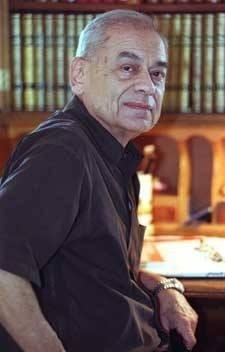SHARABI, HISHAM (1927-2005)
Born in Jaffa in 1927; spent his early childhood in Jaffa and Acre; attended the Friends’ School in Ramallah; studied Philosophy at the AUB, graduating with a BA in 1947; joined the Syrian Social Nationalist Party (SSNP) in 1947, influenced by its leader, Anton Sa’adeh; continued his studies at the University of Chicago, receiving an MA in 1949; returned to Syria to work as editor of the SSNP’s monthly magazine Al-Jil Al-Jadid; fled to Jordan after the Lebanese regime’s crackdown on the SSNP in June 1949; returned to the US to continue his studies at the University of Chicago, earning a PhD in the History of Culture in 1953; began teaching history at Georgetown University, where he attained full professorship in 1964; officially ended his affiliation with the SSNP in 1955; after the 1967 occupation and the 1968 worldwide student movement, turned more leftist; moved to Beirut in 1970 to work in the Palestine Planning Center and as Visiting Professor at the AUB (1970-71); was chosen to be editor of the Journal of Palestine Studies in 1971; with the outbreak of the civil war in Lebanon in the mid-1970s returned to Georgetown, where he held the Omar Al-Mukhtar Chair of Arab Culture and co-founded the Center for Contemporary Arab Studies; in 1979, founded the Arab-American Cultural Foundation and Alif Gallery in Washington, DC; also founded the Center for Policy Analysis on Palestine in Washington, DC, in 1990; was critical of the Oslo Accords from 1993; founded and chaired the Jerusalem Fund, a charitable organization that provides scholarships for students from Palestine; retired from Georgetown University in 1998; has extensively edited and published critical socio-political works and philosophical discourses, incl. Introduction to the Study of Arab Society (Arabic, 1975), Government and Politics in the Middle East in the Twentieth Century (1962), Nationalism and Revolution in the Arab World (1966), Arab Intellectuals and the West (1970), and his two-volume autobiography Embers and Ashes: Memoirs of an Arab Intellectual (1978) and Images of the Past: An Autobiography (1993); died of cancer on 13 Jan. 2005 at the AUB Hospital.

شرابي، هشام (1927–2005) ولد في يافا في 1927؛ قضى طفولته المبكرة في يافا وعكا؛ التحق بمدرسة الفرندز للبنين في رام الله؛ درس الفلسفة في الجامعة الأمريكية في بيروت، حصل على شهادة البكالوريوس عام 1947؛ انضم إلى الحزب القومي السوري في 1947، متاثراً بأنطون سعادة؛ أكمل دراسته في جامعة شيكاغو، حصل على شهادة الماجستير في 1949؛ عاد إلى لبنان ليعمل كمحرر في مجلة الجيل الجديد الشهرية؛ لجأ إلى الأردن بسبب فرض اجراءات صارمة من قبل الحكومة اللبنانية على الحزب القومي السوري في حزيران 1949؛ عاد إلى الولايات المتحدة ليكمل دراسته في جامعة شيكاغو، بعد حصوله على درجة الدكتوراه في تاريخ الثقافة في 1953؛ بدأ تعليم التاريخ في جامعة جورج تاون، ومن هناك حصل على الأستاذية في 1964؛ أنهى رسمياً انتسابه للحزب القومي السوري في 1955؛ انتقل إلى بيروت في عام 1970 ليعمل في مركز فلسطين للتخطيط وأستاذ زائر في الجامعة الامريكية في بيروت (1970-1971)؛ اختير ليكون محرراً لمجلة الدراسات الفلسطينية في 1971؛ مع نشوب الحرب الأهلية في لبنان في أواسط 1970؛ عاد إلى جامعة جورج تاون التي تولى إدارة مركز عمر المختار الثقافي، وشارك في تأسيس مركز الدراسات العربية المعاصرة؛ في 1979، أسس مؤسسة خيرية للثقافة العربية–الأمريكية في واشنطن العاصمة؛ كما أسس مركز للتحليل السياسي في واشنطن العاصمة، في 1990؛ كان ناقداً لمباحثات أوسلو في 1993؛ أسس وترأس صندوق القدس، المنظمة التي تقدم منح للطلاب في فلسطين؛ تقاعد من جامعة جورج تاون في 1998؛ حرر بشكل واسع ونشر أعمال اجتماعية سياسية ناقدة وفلسفة في الحديث تشمل مقدمة لدراسات المجتمع العربي (عربي، 1975)، الحكومة والسياسة في الشرق الأوسط في القرن العشرين (1962)، القومية والثورة في العالم العربي (1966)، الفكر العربي والغرب (1970)؛ ومجلدين من مذكراته في الجمر والرماد: ذكريات من الفكر العربي (1978) وتخيلات الماضي:سيره ذاتية (1993)؛ توفي بالسرطان في الثالث عشر من كانون الثاني/ يناير 2005، في مستشفى الجامعة الأمريكية في بيروت .
